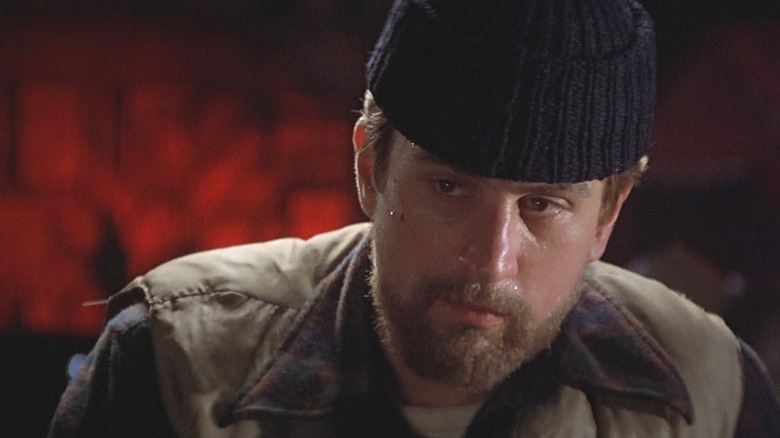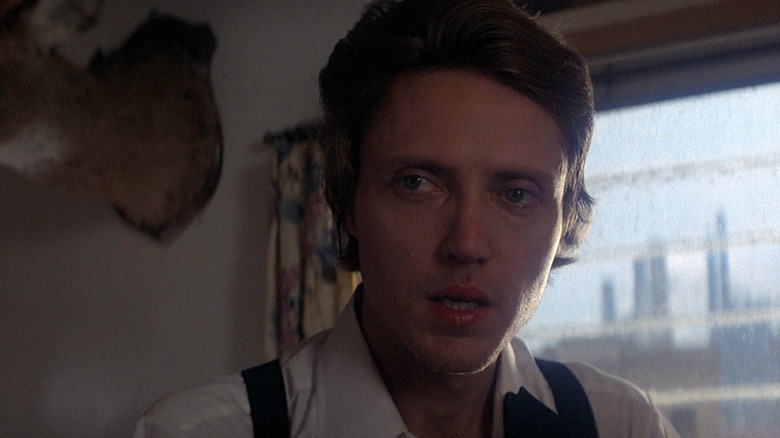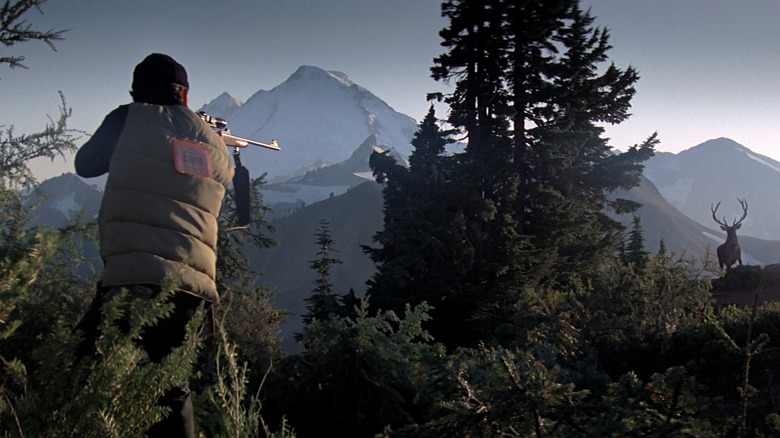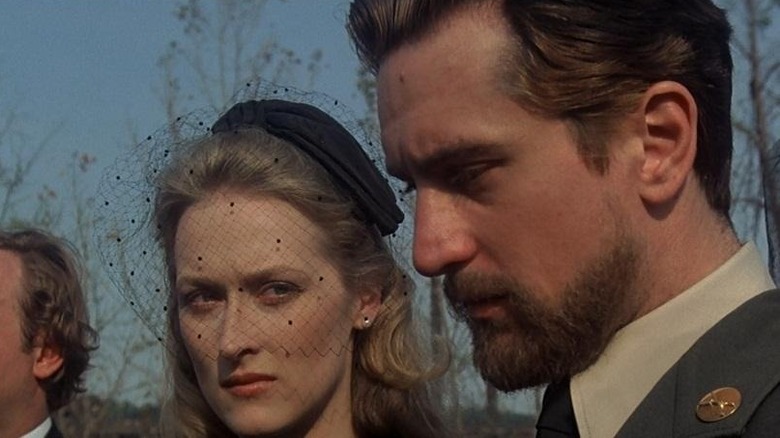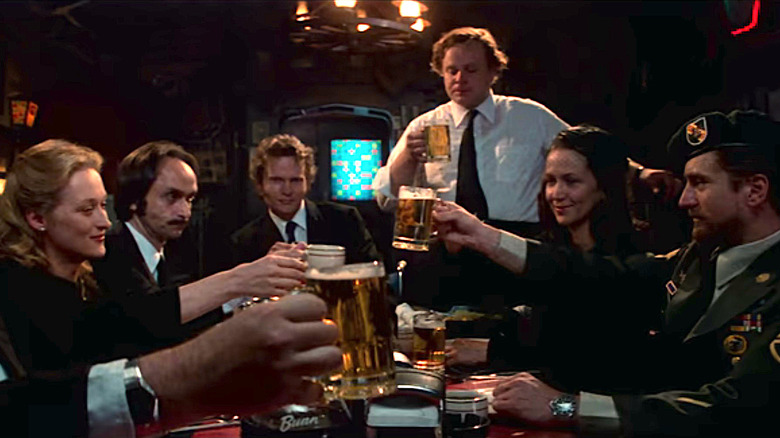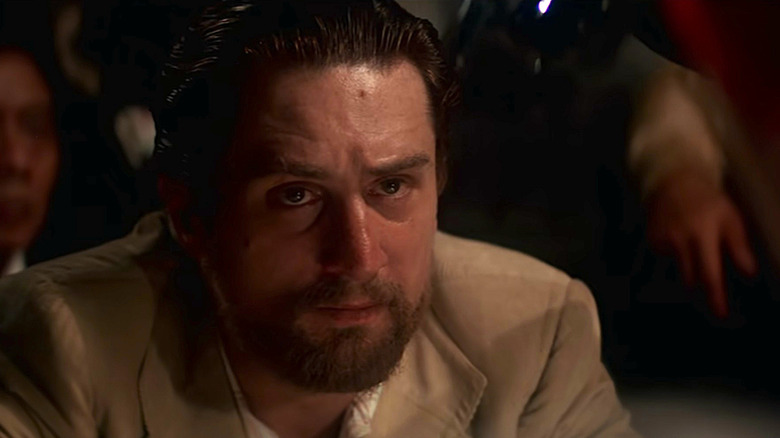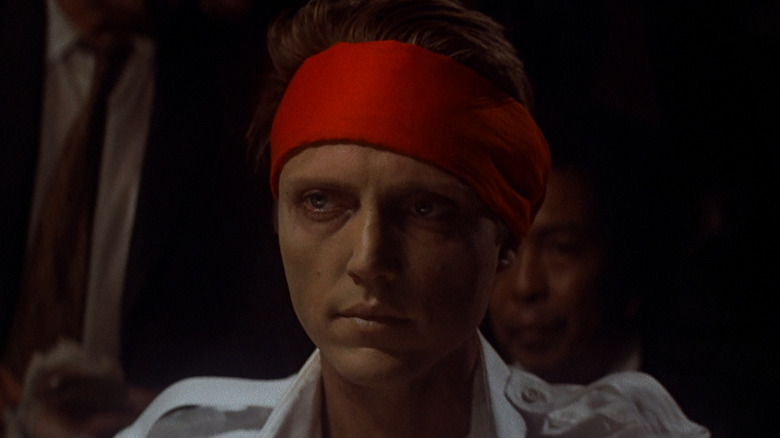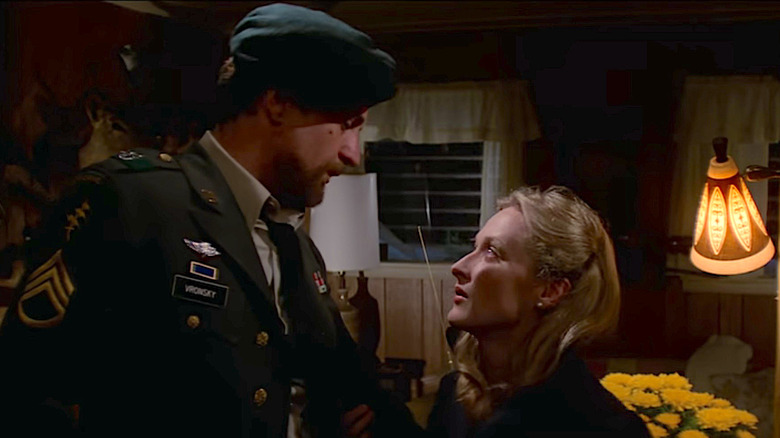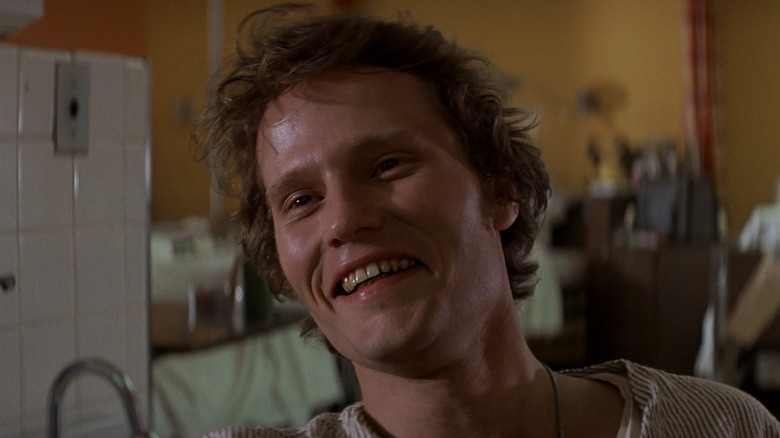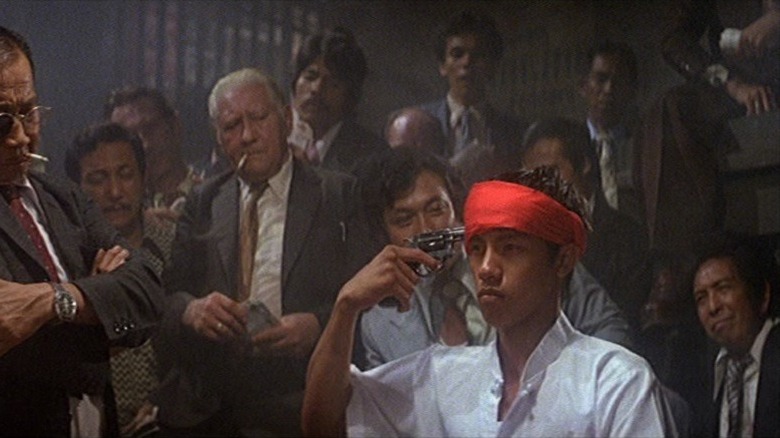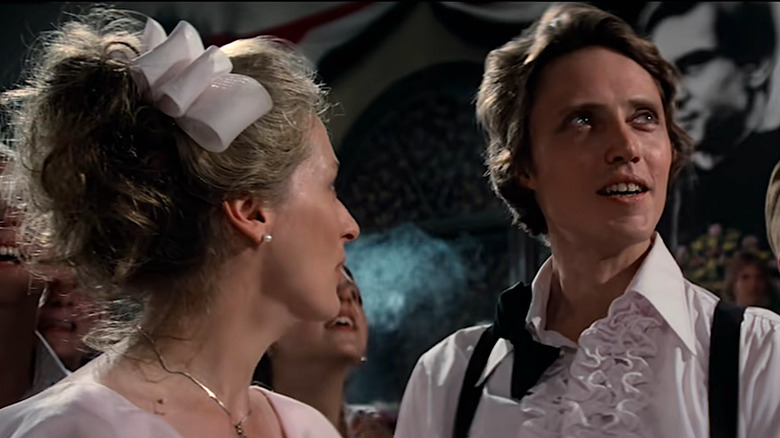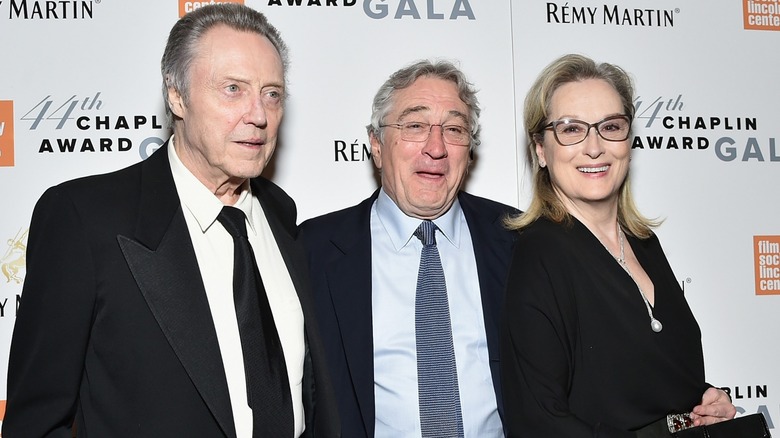The Ending Of The Deer Hunter Explained
"The Deer Hunter" is a movie about heartbreak: of war and men under pressure, and of a friendship lost when it was supposed to last forever. This 1978 Vietnam War epic follows a group of working-class buddies as they leave the steel mills of Clairton, Pennsylvania behind for the rivers of Vietnam. The young men go to war looking for excitement, but they come back forever changed.
Directed by Michael Cimino, the much-awarded and controversial film stars Robert De Niro, Christopher Walken, John Savage, and Meryl Streep. In his four-star review, Roger Ebert called it "one of the most emotionally shattering films ever made," and part of that devastation is due to the fact so much time is spent with the characters before they ship out. The movie clocks in at just over three hours, and yet the first helicopter isn't heard for almost an hour.
One of Hollywood's first attempts at reckoning with the then-recent Vietnam War, "The Deer Hunter" was loved and hated in equal measure, and its production became the stuff of legend. The movie is as powerful as it is notorious, especially in its final round of Russian roulette, and there's plenty to unpack. Read on as we explain the ending of "The Deer Hunter."
What you need to remember about the plot of The Deer Hunter
"The Deer Hunter" focuses on a group of Russian-American steelworker buddies who are excited to leave their small town to go and fight in Vietnam. Mike (Robert De Niro) is the macho man of the bunch, while Nick (Christopher Walken) is his more sensitive best friend. The two also run with Steven (John Savage), Stanley (John Cazale), Axel (Chuck Aspegren), and bartender John (George Dzundza). The friends celebrate Steven's wedding to Angela (Rutanya Alda), while the town celebrates the three men — Steven, Mike, and Nick — heading off to war.
At the wedding, it's clear Mike has a crush on Nick's girlfriend, Linda (Meryl Streep). Afterward, Nick cares for a drunken Mike and makes Mike promise that he won't leave him in Vietnam, no matter what. The next day, the friends go on one last deer hunt, and Mike shoots a buck with one shot — telling Nick that's the only way to take a deer. The sound of helicopters transitions the film to Vietnam, where the three friends are being held as prisoners of war.
They are forced to play a game of Russian roulette for their Viet Cong captors to gamble on. Mike leads Nick in a tense shootout escape. They grab Steven, and a helicopter saves the trio — but only for a moment. Steven slips into the river, and Mike goes in after him, but Nick goes AWOL in Vietnam forcing Michael to return without him. Once home, Mike avoids everyone but Linda — and discovers that Steven is now an amputee, living at a Veterans Administration (VA) hospital, and receiving money every month from someone in Saigon.
What happens at the end of The Deer Hunter?
Mike returns home to Clairton and receives a hero's welcome. However, when he sees everyone gathered to welcome him back, he urges his cab driver to take him to a hotel instead. The next day, Mike heads home and waits for his friends to leave, but Linda stays behind and the two share an emotional greeting. Mike walks her to work, and the two soon begin an affair, under the shadow of their guilt and heartache over Nick not coming home.
Mike struggles to connect with his old friends, Axel, John, and Stan. Together, they go on a deer hunt and Mike tracks a buck. Instead of taking his shot, however, he shoots into the sky which scares the deer off. Back at the cabin, Mike sees Stan playing with a loaded gun. Enraged, Mike takes a Russian roulette shot at himself. The gun clicks and Mike is safe, but his friendships are frayed — irrevocably changed by the war. Later, John is stunned to learn that Mike doesn't know Steven has already come back home and is at the VA. Mike goes to bring Steven home to his near-catatonic wife and deduces that Nick is the one sending money to Steven — winnings he's making by playing Russian roulette in Vietnam.
Mike returns to Vietnam to find Nick is now professionally playing the deadly game. While he tries to reason with his old friend, it ends with Nick winning — if you can call it that — with one fatal shot. Finally, Mike makes good on his promise not to leave Nick in Vietnam and brings his body back to Clairton. After Nick's funeral, John welcomes the group back to his bar for one final toast to their departed friend.
What does the end of The Deer Hunter mean?
In any other movie, the idea that life is like playing Russian roulette might sound corny — perhaps akin to the famous "Forrest Gump" comparison to a box of chocolates. However, in the careful hands of Michael Cimino and through the haunted eyes of Robert De Niro and Christopher Walken, the metaphor hits hard.
The Russian roulette that we all play in life has an effect, and when it comes to war, even more so. Some live, and some die — that is just the harsh reality of life. Some are crushed by the pressure of the game, some transform into an unrecognizable version of themselves, and some become better than they were because of it. In the end, all try to find a sense of normalcy and belonging. We try to keep taking chances, and even if we can't, we always try to find a home again.
One line in "The Deer Hunter" summarizes this particularly well, when Linda asks Mike "Did you ever think life would turn out like this?" While they're now together — and as happy as they can be given the circumstances — there is also the sense that life shouldn't have gone this way, that Mike and Linda should never have been together because Nick should never have died. Similarly, Mike feels at odds with his friends without Nick — none of them should be in this situation, but that's just the hand they have been dealt.
What is the meaning of The Deer Hunter's final song?
The friends in "The Deer Hunter" use music to bond, singing songs like "Dropkick Me Jesus" and "Can't Keep My Eyes Off of You." Their singing may be off-key, but it is a spontaneous moment of joy between the tight-knit group. Even John's beautiful bar piano rendition of Frédéric Chopin's "Nocturne No. 6 in G Minor" feels real — a moment of beauty offered to his friends before they leave for war. The closing number of "God Bless America" might have been meant in this same vein — but instead, it caused plenty of controversy.
John hums "God Bless America" as he makes breakfast for his mourning friends. Soon after, Mike, Linda, and the rest of the group sadly sing along. In a movie that takes a considerable amount of time to tell its story, the speed of the scene feels jarring in comparison. Many critics at the time found the scene to be a cheap play at sentimentality, overly patriotic, and anti-American.
"Their 'God Bless America' is fervent and heartfelt," Arthur Knight wrote in his review for The Hollywood Reporter. Meanwhile, producer Barry Spikings spoke of studio panic regarding the film to Vanity Fair, saying "What really upset them was 'God Bless America.' Sheinberg thought it was anti-American ... He said something like 'You're poking a stick in the eye of America.'" Director Michael Cimino clarified his intentions much later in his life, during an interview (via KGSM MediaCache). "The ending is really, not meant to be so much a statement of patriotism, but a statement of communion," Cimino says. "They begin to sing the one song they all know from grade school ... and it reunites them as a family."
Why does Mike try to save Nick?
Mike finally got out of Vietnam, so why on earth would he go back? The answer is simple: He made a promise to a friend. Before the war, Mike is protective of Nick, behaving a bit like a big brother to him. When they go hunting together, he half boasts and half advises Nick about taking a deer down with one shot.
It is an expression of compassionate cruelty in a sense. Yes, you're killing the deer, but don't let it suffer when you do it. Nick allows Mike to see his nerves about the war, stammering as he tries to describe the beauty of what is around them. While he worries Mike will judge him, these fears are unfounded, and Mike also doesn't dig too deep into his sensitive friend's struggles either.
Nick is often vulnerable around Mike, which makes Nick's hardened, blank demeanor at the end of "The Deer Hunter" so alien and alarming. Mike goes back for his friend not just because he made a promise, but because he feels responsible for the terrible change that has overcome Nick. Mike led Nick into this hunt, and he made Nick play Russian roulette so they stood a chance at surviving. During their escape, Mike didn't let Nick drown himself, but then he went to help Steven instead of staying with Nick. Mike is tough but he led someone tender into hell — and so he does all he can to save Nick from it.
What happens with Mike and Nick?
The relationship between Mike and Nick is the broken heart of "The Deer Hunter." Nick starts the film sensitive and unsure, the follower to Mike's rowdy leader. Their tactics to survive the horrors of wars instead rob them of their earlier identities. Nick morphs into a profitable death-wish machine, while Mike becomes driven, sensitive, and careful enough to be able to actually save his friend.
If Mike brushed aside Nick's sensitivities before, he draws on them in their final scene together. Mike is soft, insistent, observant, and never looks away from Nick. Nick, on the other hand, is an emotionless brick wall. Mike risks his life in the roulette game in order to save Nick. "I love you, Nick," he says and pulls the trigger. Mike's life is spared, and Nick has a glimmer of recognition for his old friend.
Encouraged, Mike reminds Nick of their earlier hunting trips, and Nick seems to be coming back. He echoes Mike's words — "One shot" — and Mike is elated to have finally reached him. But then Nick smiles a terrible smile, puts the gun to his temple, and shoots. The moment is powerful enough without any labored symbolism, but in that moment Nick is the deer Mike didn't kill kindly, and it took too many shots to end his misery.
What happens with Mike and Linda?
Throughout "The Deer Hunter," the characters frequently ask and answer the question, "You okay?" Everyone always says they are, and it's always a lie. The last time any character in "The Deer Hunter" is anything close to okay is in the drunken, bittersweet, and happy moments at Steven and Angela's wedding. The men go away to war hoping to come home as heroes, but when Mike does return, he can't face the hero's welcome waiting for him. He, Steven, and Nick are forever changed by their experiences — and they don't have the words to express it.
As Mike flees from Linda and his own home in favor of a hotel room, he tells her "I feel a lot of distance, and I feel far away," and he has to grasp for these words. He apologizes but still flees, and she — equally not okay — chases after him. Neither has the words for their loss, but what they do have is each other.
Mike is softer upon his return, which makes his last trip to Vietnam to save Nick all the more heartbreaking. The pressure of war has forced Mike to let his guard down, and he is a better and more emotionally available person because of it. Despite Mike's damaged heart and his sorrowful screams as he cradles the bloodied Nick, we get the sense that Mike will be more open about his feelings after this. He is tender to everyone at the bar after Nick's funeral and most of all to Linda.
What happens to Steven?
No one is dealt a winning hand in "The Deer Hunter", but Steven starts things out with more promise than any of his buddies. He marries Angela and does so against the wishes of his overbearing mother. He was funny and full of life ... and then he went to Vietnam.
Steven's mobility is stolen by the war after his jump into the river ruins his legs. While Michael returns to Clairton looking every inch the handsome decorated hero, Steven — like so many other veterans — convalesces at the VA, playing bingo with older men and fellow soldiers who are all struggling to reintegrate into their old lives.
Steven avoids his wife and child, and the movie posits that he's hiding from reality at the VA — so much so that Mike forcing him to return home seems to be painted as honorable. Regardless of the director's intention, to modern eyes, Steven's fate is less cowardly and more a condemnation of a system that does not provide adequate support to those who have served.
What is the controversy surrounding Russian Roulette in The Deer Hunter?
There are two major strikes against the way "The Deer Hunter" leans so hard on the game of Russian roulette. The first is quite simply that no documented case of the Viet Cong conducting such a cruel game has ever been recorded. In fact, the Russian roulette storyline is lifted directly from a script that producers Barry Spikings and Michael Deeley brought to Michael Cimino called "The Man Who Came to Play," which was about friends going to Las Vegas to play Russian roulette.
War journalist Peter Arnett wrote for the LA Times (via VVAW) of the lack of reported cases of Russian roulette, and otherwise damned Cimino's film, saying: "His portrayal of the Vietnamese people as inhuman monsters, for whom life is cheap, perpetuates the racist stereotype that sustained much of America's involvement in Indochina."
Movies aren't reality, but "The Deer Hunter" trades hard on realism. Though there is no denying the emotional metaphor and visual power of Russian roulette in the film, there is also no defense of the film's racism. "I don't think any of us meant it to be exploitive," Spikings tells Vanity Fair. "But I think we were ... ignorant. I can't think of a better word for it. I didn't realize how badly we'd behaved to the Vietnamese people."
The Deer Hunter's alternate ending
"The Deer Hunter" went through quite the transformation from a Vegas-set Russian roulette script to an Oscar-winning Vietnam War movie. The drama between Michael Cimino and co-screenwriter Deric Washburn could probably merit its own Hollywood production, but a glance at the duo's original script for "The Deer Hunter" shows a different — but familiar — direction the movie could have gone.
The first major change is that Mike's character could have been named "Merle", and the close Russian-American community of Clairton was initially intended to be Greek. But these changes are nothing compared to the first imagined ending. In the original script, Mike is the one who stays behind in Vietnam, and when Nick comes back to save him, Mike tells him he likes it there. "His eyes are pale, like faded robin's eggs," reads the original action line. "They seem to look through Nick, as if to some landscape far beyond."
That look seems to match the energy of Christopher Walken's eventual performance. However, the original script has Mike verbalize why he stays to gamble with his life, saying, "I like it, Nick ... I like it because it's simple." The fatal shot happens off-screen, and while the moment is still intense, it has nothing on the ending we got.
What have the cast of The Deer Hunter said about the film?
"The Deer Hunter" won five Academy Awards, including best picture, best director, and best supporting actor for Christopher Walken. Many of the actors have described making the film as both exhausting and exhilarating. "The circumstances were genuine," Walken recalled to Janet Maslin in a 1978 New York Times article. "We'd been tied up. There were mosquitoes. There were rats.”
Walken also admitted to subsisting on a meager diet to prepare for the final roulette scene and described the direction Michael Cimino gave him and Robert De Niro for the key scene. Speaking to The Guardian, Walken relayed Cimino's minimal instructions: "You put the gun to your head, Chris, you shoot, you fall over and Bobby [De Niro] cradles your head." Walken elaborated further on the spontaneity of the film in an interview with Rolling Stone, saying, "Making that movie was a little like making jazz, playing off each other. That's particularly because of the actors involved. Accidents happen while the camera's rolling, so it was spontaneous within a structure."
Some accidents on the set of "The Deer Hunter" almost cost De Niro his life, but he has still spoken positively about his time working on the film. In Jay Glennie's book "One Shot: The Making of The Deer Hunter," De Niro said, "I always felt that The Deer Hunter was going to be a good movie; otherwise I wouldn't have done it. It had its flaws, but there was something very special about it."
